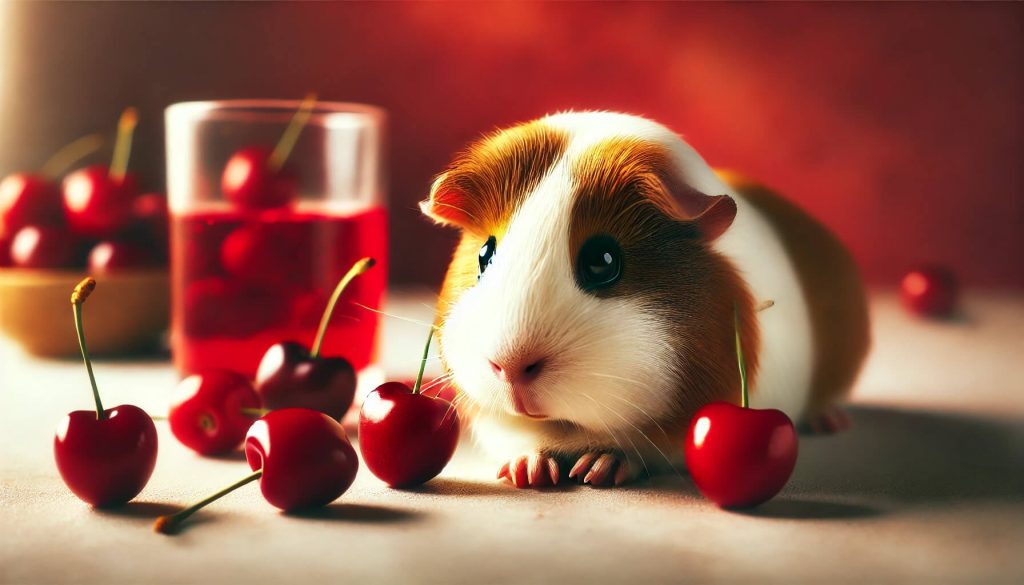
Can Guinea Pigs Eat Cherries?
Understanding Guinea Pig Diet Basics
Guinea pigs have unique dietary needs. Knowing what your guinea pig should eat is crucial for maintaining its health.
What Do Guinea Pigs Normally Eat?
Guinea pigs primarily eat hay, which helps with digestion and keeps their teeth healthy. Fresh vegetables like bell peppers, cucumbers, and leafy greens (e.g., romaine lettuce) offer essential nutrients. Pellets designed specifically for guinea pigs provide a balanced diet but should be given in moderation. Ensure access to clean, fresh water at all times.
The Importance of Vitamin C
Guinea pigs can’t produce Vitamin C, making it a critical component of their diet. Deficiency can lead to scurvy, causing joint pain, hair loss, and lethargy. Supplement their diet with Vitamin C-rich vegetables like kale and bell peppers. Special Vitamin C pellets and drops are also available but consult your veterinarian before making any changes.
Can Guinea Pigs Eat Cherries?
Guinea pigs can eat cherries, but moderation is crucial. Cherries offer some benefits and pose several risks.
Benefits of Cherries for Guinea Pigs
Cherries provide vitamins and fiber:
- Vitamin C: Cherries contain Vitamin C, essential for guinea pigs, which helps prevent scurvy.
- Fiber: The fiber aids digestive health and maintains regular bowel movements.
- Antioxidants: Cherries are rich in antioxidants, boosting overall health.
Potential Risks and Concerns
Cherries present potential issues:
- Sugar Content: High sugar can lead to obesity and dental problems.
- Pit and Stem: Both are choking hazards and contain cyanogenic compounds, which are toxic.
- Quantity: Excessive cherries cause diarrhea due to the high sugar and water content. Limit to one cherry, twice a week.
Always wash cherries thoroughly before serving to remove pesticides.
How to Safely Introduce Cherries to Your Guinea Pig’s Diet
Introducing cherries to your guinea pig’s diet requires careful attention to portion sizes and feeding frequency. Avoid overfeeding to prevent health complications.
Correct Portion Sizes
Serve only a quarter of a cherry per serving. Remove pits and stems to prevent choking hazards. Cut the cherry into small, manageable pieces to facilitate easy consumption for your guinea pig.
Frequency of Feeding Cherries
Limit cherry feeding to twice a week. Space out servings to avoid digestive issues. Ensure cherries are washed thoroughly to eliminate pesticide residues before feeding them to your pet.
By managing portion sizes and feeding frequency effectively, you can safely include cherries in your guinea pig’s diet as an occasional treat.
Alternative Fruits for Guinea Pigs
When considering safer fruit options for your guinea pig, select fruits that offer nutritional benefits without adverse effects.
Safer Fruit Options
- Apples: Remove seeds and core, as they contain harmful substances. Apple slices provide fiber and Vitamin C.
- Blueberries: Rich in antioxidants and low in sugar, blueberries make a healthy occasional treat.
- Strawberries: Offer Vitamin C and fiber, though you should avoid tops and limit servings due to sugar content.
- Pears: Pears provide fiber and Vitamin C; ensure you remove seeds and limit portions to avoid digestive issues.
- Watermelon: High water content helps with hydration, but remove seeds and rind to prevent choking.
- Grapes and Raisins: High sugar content poses a risk for obesity and diabetes in guinea pigs.
- Oranges: High acidity can cause mouth sores and stomach upset; better to avoid.
- Avocados: Contain persin which is toxic to guinea pigs, so always avoid.
- Mangoes: High sugar levels lead to obesity and potential digestive problems.
- Pineapples: While they contain Vitamin C, their high acidity can disturb the guinea pig’s digestive system.
Conclusion
Understanding what fruits are safe for your guinea pig is crucial for their well-being. Cherries can be a delightful treat when given in moderation, but you must be mindful of the potential risks. Always ensure they’re pitted and washed to avoid any health issues. Remember to balance their diet with a variety of other safe fruits and vegetables to keep them healthy and happy. By following these guidelines, you’ll provide a nutritious and enjoyable diet for your furry friend.
